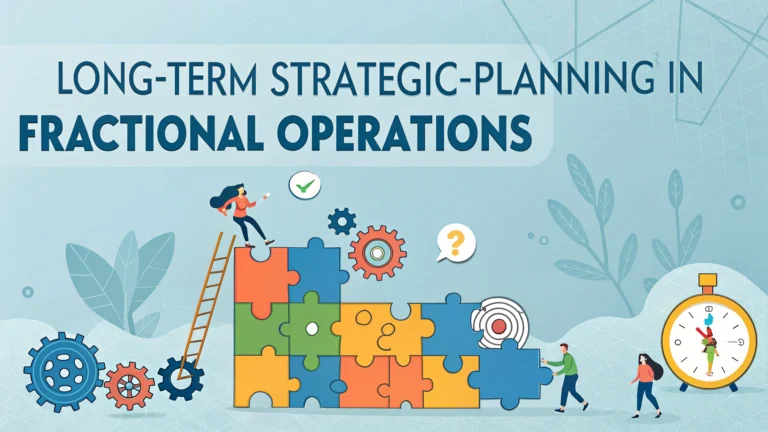Strategic planning takes on unique dimensions when applied to fractional C-suite operations, where executives split their time between multiple organizations.
Long-term planning in fractional operations requires balancing scalability with personalized client attention while maintaining consistent growth across different business engagements.
This article outlines practical approaches for fractional COOs to develop and implement effective long-term strategies that serve both their practice and client organizations.
Core Elements of Fractional COO Strategic Planning
- Resource allocation frameworks
- Client portfolio management
- Service delivery optimization
- Growth trajectory planning
- Risk management protocols
Building a Sustainable Client Base
Identify target industries and company sizes that align with your expertise and capacity limitations.
Set clear engagement parameters, including minimum commitment periods and scope definitions.
| Company Size | Recommended Time Allocation | Typical Engagement Length |
|---|---|---|
| Startup | 8-12 hours/month | 6-12 months |
| Small Business | 15-20 hours/month | 12-24 months |
| Mid-Market | 25-30 hours/month | 18-36 months |
Time Management and Scaling Strategies
Implement systems to track and allocate time across multiple client engagements effectively.
- Project Management Tools: Asana, Monday.com, or Trello for multi-client oversight
- Time Tracking Software: Harvest or Toggl for accurate billing and capacity planning
- Communication Platforms: Slack or Microsoft Teams for client collaboration
Service Evolution and Market Adaptation
Regular service offering reviews ensure alignment with market demands and client needs.
- Quarterly service package assessments
- Annual market research updates
- Client feedback integration
- Competitive analysis
Building Support Systems
Create a network of trusted professionals to support various aspects of client operations.
- Legal advisors
- Financial experts
- HR consultants
- Industry specialists
Risk Management and Succession Planning
Develop contingency plans for both your practice and client organizations.
- Documentation of key processes
- Cross-training procedures
- Emergency response protocols
- Client transition strategies
Moving Forward with Strategic Growth
Focus on sustainable expansion that maintains service quality while increasing market reach.
For more information on fractional COO services and strategic planning, contact professional organizations like the Chief Operating Officers Business Forum (www.coobusinessforum.com) or the Fractional Leadership Network.
Measuring Success and KPIs
Establish clear metrics to track both practice performance and client success outcomes.
- Client retention rates
- Revenue growth per client
- Service delivery efficiency
- Client satisfaction scores
- Practice profitability metrics
Technology Integration and Digital Transformation
Leverage technology solutions to enhance service delivery and operational efficiency.
Essential Tech Stack Components
- Cloud-based collaboration tools
- Business intelligence platforms
- Automation solutions
- Virtual meeting platforms
Professional Development and Expertise Enhancement
Maintain competitive advantage through continuous learning and certification.
- Industry-specific certifications
- Leadership development programs
- Emerging technology training
- Best practices workshops
Scaling Your Practice Responsibly
| Growth Phase | Focus Areas | Key Investments |
|---|---|---|
| Initial | Core service refinement | Basic systems and tools |
| Expansion | Process standardization | Support staff and technology |
| Maturity | Service diversification | Advanced solutions and partnerships |
Empowering Sustainable Growth Through Strategic Leadership
Success in fractional COO services depends on balancing scalability with personalized attention while maintaining unwavering commitment to client success. By implementing robust systems, leveraging technology, and focusing on continuous improvement, fractional COOs can build sustainable practices that deliver lasting value to clients.
Remember that strategic planning in fractional leadership is an iterative process that requires regular review and adjustment to remain effective and relevant in a rapidly evolving business landscape.
Visit industry resources and professional networks to stay connected with the latest trends and best practices in fractional executive leadership.
FAQs
- What is long-term strategic planning in fractional COO operations?
Long-term strategic planning in fractional COO operations involves developing and executing comprehensive business strategies while working in a part-time or shared executive capacity, focusing on operational excellence, scalability, and sustainable growth over extended periods. - How does a fractional COO balance multiple clients’ long-term strategies?
A fractional COO balances multiple clients by establishing clear boundaries, implementing structured systems, dedicating specific time blocks to each client, and utilizing project management tools to track and execute various strategic initiatives simultaneously. - What timeframe should long-term strategic planning cover in fractional operations?
Long-term strategic planning typically covers 3-5 years, with detailed quarterly milestones and annual reviews to ensure alignment with company goals while maintaining flexibility for market changes and organizational evolution. - How do fractional COOs ensure continuity in strategic implementation?
Fractional COOs ensure continuity by documenting processes, establishing clear KPIs, building strong leadership teams, implementing robust reporting systems, and creating detailed handover protocols for seamless execution between visits. - What are the key components of a successful long-term strategy in fractional operations?
Key components include market analysis, operational efficiency plans, scalable systems development, resource allocation frameworks, risk management strategies, succession planning, and measurable performance metrics. - How do fractional COOs adapt long-term strategies during organizational changes?
Fractional COOs adapt strategies by maintaining flexible frameworks, conducting regular strategy reviews, implementing change management protocols, and adjusting plans based on market conditions and organizational needs. - What tools do fractional COOs use for long-term strategic planning?
Common tools include strategic planning software, project management platforms, business intelligence tools, financial modeling systems, risk assessment frameworks, and collaboration platforms for remote team coordination. - How do fractional COOs measure the success of long-term strategic initiatives?
Success is measured through defined KPIs, ROI analysis, operational efficiency metrics, market share growth, employee performance indicators, customer satisfaction rates, and financial performance benchmarks. - What role does technology play in fractional COO strategic planning?
Technology enables remote collaboration, data analysis, process automation, performance tracking, communication management, and the implementation of scalable solutions across multiple client organizations. - How do fractional COOs manage stakeholder expectations in long-term planning?
Stakeholder expectations are managed through regular communication, transparent reporting, clear milestone setting, realistic goal alignment, and consistent updates on strategic progress and adjustments.







